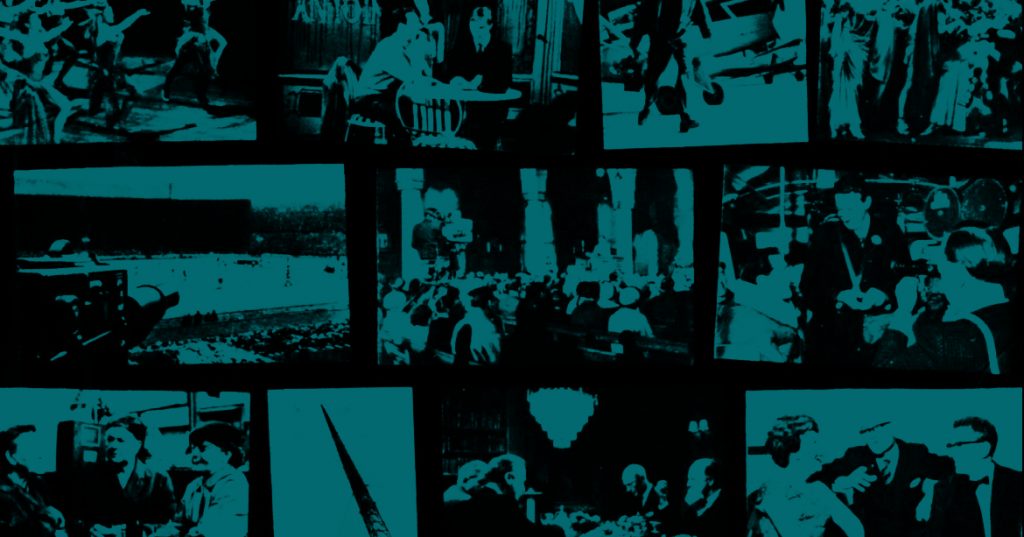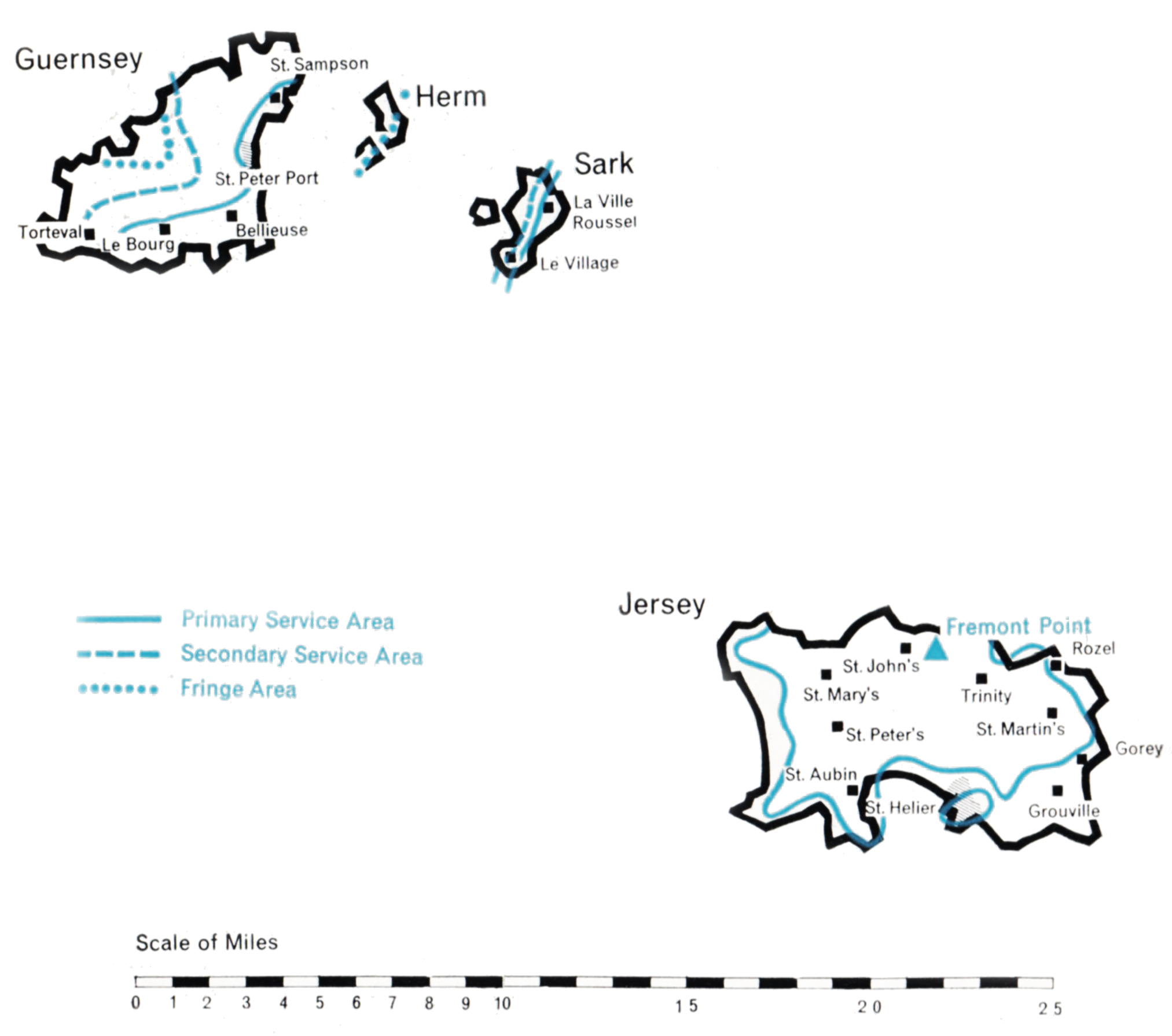ITV 1963
An excerpt from the Independent Television Authority’s yearbook for 1963

Channel Islands

Channel Television is the trading name of Channel Islands Communications (Television) Limited, which is a limited liability company registered in Jersey and is the programme contractor appointed by the Independent Television Authority for the Channel Islands.
 Channel Television Centre, Rouge Bouillon, St. Helier, Jersey C.I.
Channel Television Centre, Rouge Bouillon, St. Helier, Jersey C.I.
CENTRAL 23451
Smith Street, St. Peter Port, Guernsey C.I.
CENTRAL 3408
Mercury House, Knightsbridge, London S.W.7.
KNIghtsbridge 3761
| ITA Transmitter | Channel | Vision Frequency (Mc/s) | Sound Frequency (Mc/s) | Opening Date | Population (000’s) | ITA Homes (000’s) |
|---|---|---|---|---|---|---|
| Fremont Point | 9 | 194.75 | 191.25 | 1st Sept 1962 | 100 | 25 |
Directors
WH Krichefski, OBE (Chairman); Mrs George Troy; Deputy EH Bodman; C Forbes Cockell; Conseiller ED Collas; Harold Fielding; AG Harrison; G le G Peek; WN Rumball; Advocate K Hooper Valpy.
Officers
Kenneth A Killip (General Manager); Edwin F Baker (Secretary); Brian Turner (Operations Manager); Ron Blundell (Sales Controller); John Peplow (Local Sales Manager); Ward J Rutherford (Head of News and Features).
Staff
The total staff of the station is 65. This includes a staff of five at the Guernsey office and 14 at the London office.
Visits to Studios
Channel Television does not, in general, originate programmes in which there is audience participation. Applications to visit the studios may, however, be made to Miss Betty Fearon, Channel Television Centre, Rouge Bouillon, Jersey, by groups of up to ten people wishing to see them.
Religious Advisory Committee
Canon AS Giles, Dean of Jersey (representing Anglican Church, Jersey); Canon AV Olney (Roman Catholic, Jersey); Rev. WNC Wooldridge (Free Churches, Jersey); Rev. KC Cadman (Anglican Church, Guernsey); Rev. C Bozeat (Free Church, Guernsey); Father L Targett (Roman Catholic Church, Guernsey).
Agricultural Advisory Committee
EJ de Garis (Guernsey); GC Sowells (Guernsey); HP Martel (Guernsey); EA Wheadon (Guernsey); PJ Le Masurier (Jersey); Deputy Mrs Phyllis Green (Jersey); L du Feu (Jersey).
Enquiries
Enquiries about artistes and programmes should be addressed either to the Editor, The Channel Viewer, Smith Street, St. Peter Port, Guernsey, or Viewers’ Correspondence, Channel Television Centre, Rouge Bouillon, Jersey.
Submission of Script
By its nature, Channel Television’s script requirements are limited and would only be of interest if they were of a strictly local nature. The Head of News and Features, however, welcomes ideas for items of a local nature, and these should be addressed to him.
Programme Journal
The Channel Viewer is published by Channel Islands Communications (Television) Limited, and its editorial address is Smith Street, St. Peter Port, Guernsey.
Studios
Studio One at the Television Centre, area 1,000 sq. ft., has facilities for Channel local origination, measures 40′ × 25′. Equipped with two Vidicon cameras. The Studio has been designed with room for expansion as the station grows. Room for expansion has also been allowed for in the technical area and in the administrative block by the addition of another storey. The station also has a small presentation studio, equipped with a Vidicon type camera.
Other technical facilities: two telecine machines, capable of taking 35-mm. (optical track) or slides. One is additionally equipped to take 16-mm. optical or magnetic track film.
Film Facilities
The station has two film units equipped with Bach-Auricon 16-mm, Pro 600 Special sound or silent cameras. One is permanently stationed in Guernsey, and the other in Jersey. The station is equipped with an automatic processor and uses reversal stock, transmitting positive.
Technical Development
The station has experimented successfully with 8-mm. film transmission, and has one telecine equipped to take an 8-mm. projector when necessary. This has added greatly to the versatility of a small station by making it possible to use film shot by amateurs or film already existing on 8-mm. stock.
Programmes
Channel News, a local newscast and newsreel, is transmitted every day. Channel News Summary, a daily late-night summary of local news, transmitted each day, including Saturdays and Sundays. Channel Sports Round-up, a weekly rundown on Channel Islands sports activities, transmitted on Thursdays. Studio Tuesday and Studio Friday, two weekly magazine/topicality type programmes, interpreting the local news and events and bringing Island personalities to the screen. The Church in View, a monthly religious forum, in which Church leaders from all the islands participate, and face viewers’ questions. The Day is Ended, a nightly religious talk by Island Church figures. The News in French, a nightly programme, echoing the British viewpoint on the news and international events, transmitted in French. Island Farmer, a weekly programme of the Islands’ agricultural and horticultural life. Serenade, an occasional musical programme, in which local entertainers are presented. Island Forum, an irregular programme, in which local topics are presented, e.g., housing, the effects on the Channel Islands of Britain joining the Common Market. Visitors’ Book, an irregular programme, in which eminent people visiting the Channel Islands are introduced to Channel viewers. Weather, a daily forecast for the Islands, coming direct from the Meteorological Department of the States of Jersey Airport.
- Population within measured contours: Primary 0.0513 mn, Secondary 0.0449 mn, Fringe 0.0038 mn. Total 0.10 mn.
- Channel: Band III Channel 9 (horizontally polarised)
- Vision Carrier Frequency: Actual 194.75 Mc/s
- Sound Carrier Frequency: Actual 191.25 Mc/s
- Effective Radiated Power: Vision 10 kw maximum. Sound 2.5 kw maximum.
- Power of Transmitters: Vision (peak white) 2 x 0.5 kW. Sound (carrier) 2 x 1.25 kW
- Heights above sea level: Site 330 ft above sea level. Mean aerial 760 ft. above sea level
- Location: 2° 7′ 52″ W, 49° 15′ 8″ N.
Fremont Point (Channel 9)
The Channel Islands lie in a dispersed group well out in the English Channel and close to the French coast, off the Cherbourg Peninsula. The population is concentrated mainly in the two largest islands, Jersey and Guernsey, about 6o,ooo in the former and 4o,ooo in the latter. The largest town is St. Helier on Jersey. The distance between Jersey and the Authority’s nearest mainland transmitting station, Stockland Hill, is about 120 miles, virtually all across sea. The island nearest to Stockland Hill is Alderney, the path length in this case being about 8o miles.
Studies showed that the only Band III channel which could be used to cover the islands without causing harmful interference in the service areas of several French stations was Channel 9, horizontally polarised, and even with this channel it would be necessary to restrict the power radiated towards the French coast to about 1 kW. Accordingly it was necessary to site the transmitting station on the north coast of Jersey, where 1 kW was just enough to serve that island, and to beam a higher power, 10 kW, across the sea to Guernsey which lies 25 miles distant in the direction of the English mainland.

The supply of mainland programmes to the Jersey station for rebroadcasting in the islands presented unusual problems because, of necessity, both Stockland Hill and Fremont Point had to use Channel 9. The solution was to install on the small island of Alderney an “off the air” receiving station using diversity reception techniques, to pick up the Channel 9, vertically polarised, transmission from Stockland Hill 8o miles away and pass it over a multichannel microwave link to Fremont Point. The overseas path length of the microwave circuit is about 4o miles. To ensure that the Stockland Hill signal could be received in Alderney without interference from Fremont Point, the power radiated by Fremont Point towards Alderney on the same channel had to be restricted to the low value of 200 watts. This means that the people of Alderney are unable to receive the local programmes transmitted by Fremont Point, but fortunately many of them are able, with good aerials and receivers, to view directly if somewhat inconsistently the transmissions from Chillerton Down on Channel 11.
There are many complications in this apparently simple vision link scheme. The distances are such that the changing propagation conditions over the sea paths involved will cause wide fluctuations in the strength of the signals received in Alderney from Stockland Hill, and for a small proportion of the time these signals may be unusable for rebroadcasting from Fremont Point. The programme service began on 1st September 1962.



